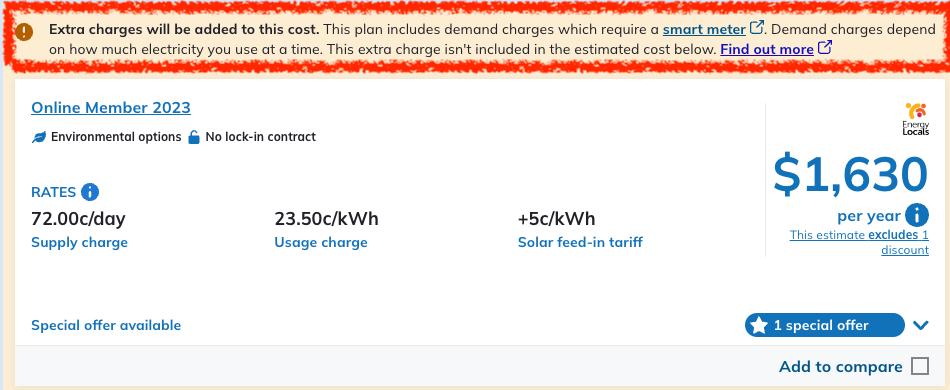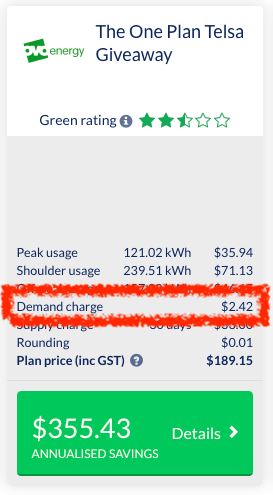Here’s the game you didn’t know you needed to play
Electricity distribution networks are complicated. So are the games based on them.
The ACCC has declared its gloves-off time for the comparison sites.

At Bill Hero HQ yesterday we were delighted to see ACCC Chair, Gina Cass-Gottlieb, announcing that ACCC is taking a renewed interest in price comparison websites.
We are concerned that price comparison websites can mislead consumers in a number of ways ... We want there to be be accurate representations and disclosure of commercial arrangements by price comparison websites.
9 News report on ACCC Chair Gina Cass-Gottlieb announces a new focus on comparison websites
The Project report on ACCC Chair Gina Cass-Gottlieb announces a new focus on comparison websites
Too right. For far too long, the so-called ‘comparison sites’ have badly underserved consumers. They purport to help you find a better-priced deal, but in reality, they are thinly veiled sales channels for their ‘panel’ of participating retailers that pay them commissions
There is a famous truism in media and online services that if you’re not paying for a service, then you’re the product.
If you’re not paying for it, you’re not the customer. You’re the product being sold.
All you’ve got to do is follow the money and its easy to see who’s buying what.
In the case of energy comparison sites, of course, it’s the energy retailers who are the real customers. They pay commissions to the comparison sites in return for acquiring new consumers.
More broadly, the providers themselves have control over many of the sites that allegedly compare their products.
For example, research conducted by Bill Hero partner CHOICE finds that comparison sites are often owned or affiliated with the insurance companies they compare, with insufficient disclosure of the underlying relationships:
In addition, there’s significant consolidation in the sector – Compare the Market acquired iSelect in a transaction that the ACCC chose not to oppose back in 2022.
This is not the first time that the ACCC has expressed interest in comparison websites. For example, it published The Comparator Website Industry in Australia report back in 2014:
Since that time, ACCC has issued numerous proceedings against retailers and comparison sites, leading to significant fines and a number of ‘enforceable undertakings’ for comparison websites that were found to have breached the guidelines in different ways. In one of the highest-profile cases in October 2020, the Federal Court ordered iSelect to pay $8.5 million in penalties for making false or misleading representations about its electricity comparison service.
iSelect admitted that ... it misled consumers by representing on its website that it would compare all electricity plans offered by its partners and recommend the most suitable or competitive plan, when this was not the case.
Actually, iSelect’s commercial arrangements with partner electricity retailers [meant] the recommended plans were not necessarily the most suitable or competitive.
In its Statement of Compliance and Enforcement Priorities for 2024-25, the ACCC has reiterated its focus on the corner of the commercial landscape that Bill Hero is most concerned with: “Promoting competition in essential services with a focus on telecommunications, electricity, gas and financial services.”
It also included price comparison websites among its shortlist of priorities for the 2024-25 financial year ahead:
Consumer and fair trading issues in the digital economy, with a focus on misleading or deceptive advertising within influencer marketing, online reviews, in-app purchases and price comparison websites.
Bill Hero welcomes this policy priority.
Why are we so sanguine about the promise of intense scrutiny in this industry? It’s because we’re different and better than our so-called competitors, and we’ve pioneered a model that actually works.
Bill Hero is very different from the ‘first generation’ price comparison websites, whose butts we look forward to being kicked by the ACCC.
We’ve built a ‘next generation’ approach to energy comparison and procurement that turns the comparison business model and commercial economics completely upside down to deliver a user-pays and service-led model that lives or dies by the genuine value we can deliver to our true customers – energy consumers just like you. We call this ‘Savings as a Service’.

Not a subscriber yet? What are you waiting for! Never overpay for energy again! Bill Hero automatically compares every bill to help keep you always on the best priced plan.
Here’s why our Savings as a Service model is different and better than the commercial comparison sites:
And we’re even better than the official Government comparison sites, Energy Made Easy and Victoria Energy Compare. Like Bill Hero, the government sites do include every retailer and plan, which is a great start, but we offer additional service innovations for energy consumers that go well beyond what’s available from the government:
A key and fast-growing concern in the Australian retail energy landscape is the introduction of Demand tariffs to residential energy consumers.
Demand tariffs bring a new and potentially very punitive cost element into residential energy bills, where you get charged not only for the total number of kWh you consume, but also for the peak intensity of that consumption.
The peak demand charge gets applied across the entire billing period, so a momentary spike in usage can cause much higher energy prices for an entire billing cycle.
Unfortunately for the many Australian energy consumers now being pushed onto Demand tariffs by their distributors and retailers, despite being urged to use the official government services to find a better deal, the official government websites simply cannot perform a Demand-based comparison:

Bill Hero can:

This is just one example of how, at Bill Hero, we’re committed to driving competition in the retail energy market through innovative, transparent, market-wide price comparison and an unprecedented, fully automated, high-quality experience that adds the missing service component to the comparison and switching landscape.
We’re Bill Hero, and we’re at your service.
Savings as a Service is the blog site and newsletter from Bill Hero. Subscribe now and get your energy savings tips and information delivered fresh to your inbox every month.